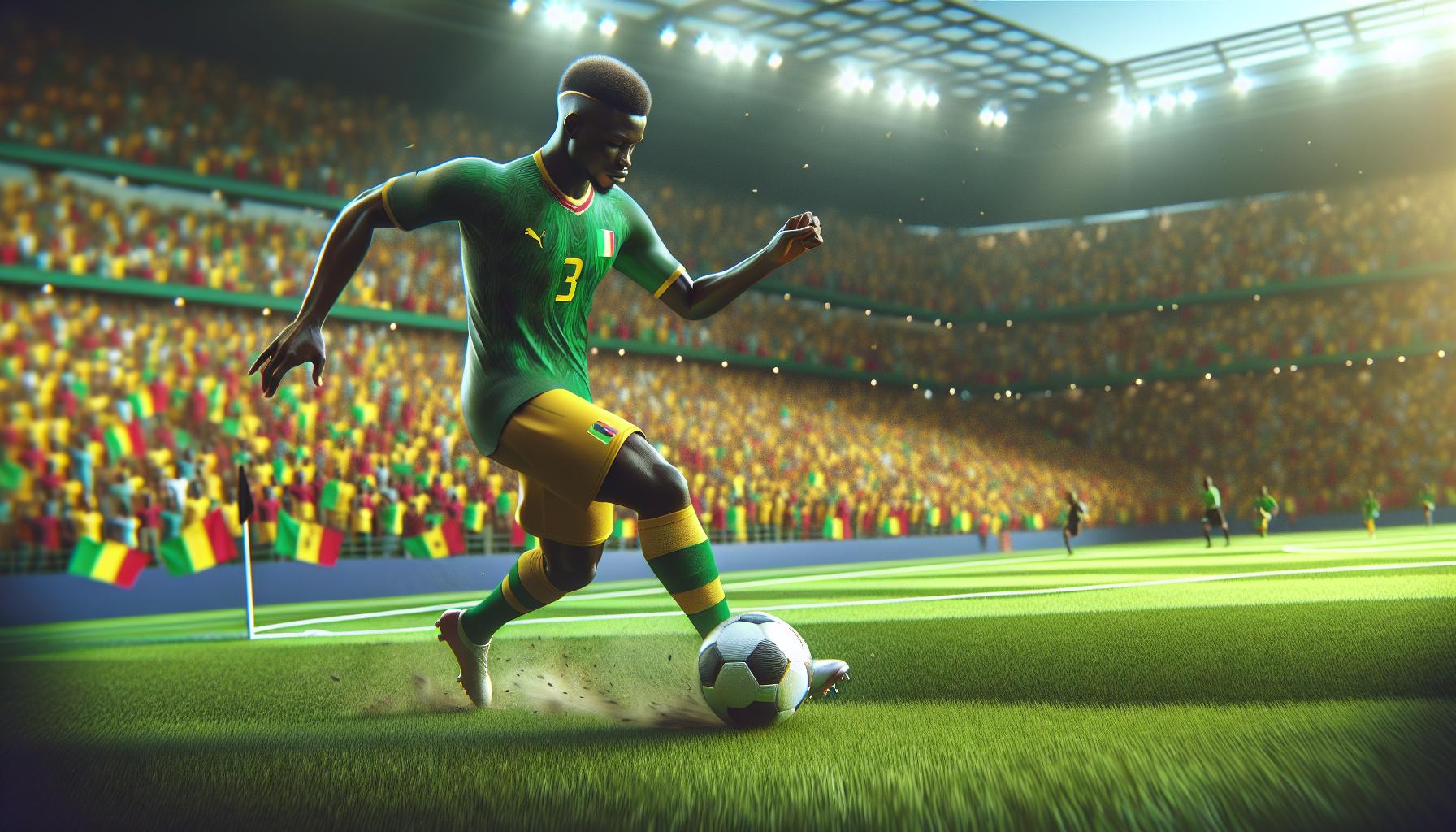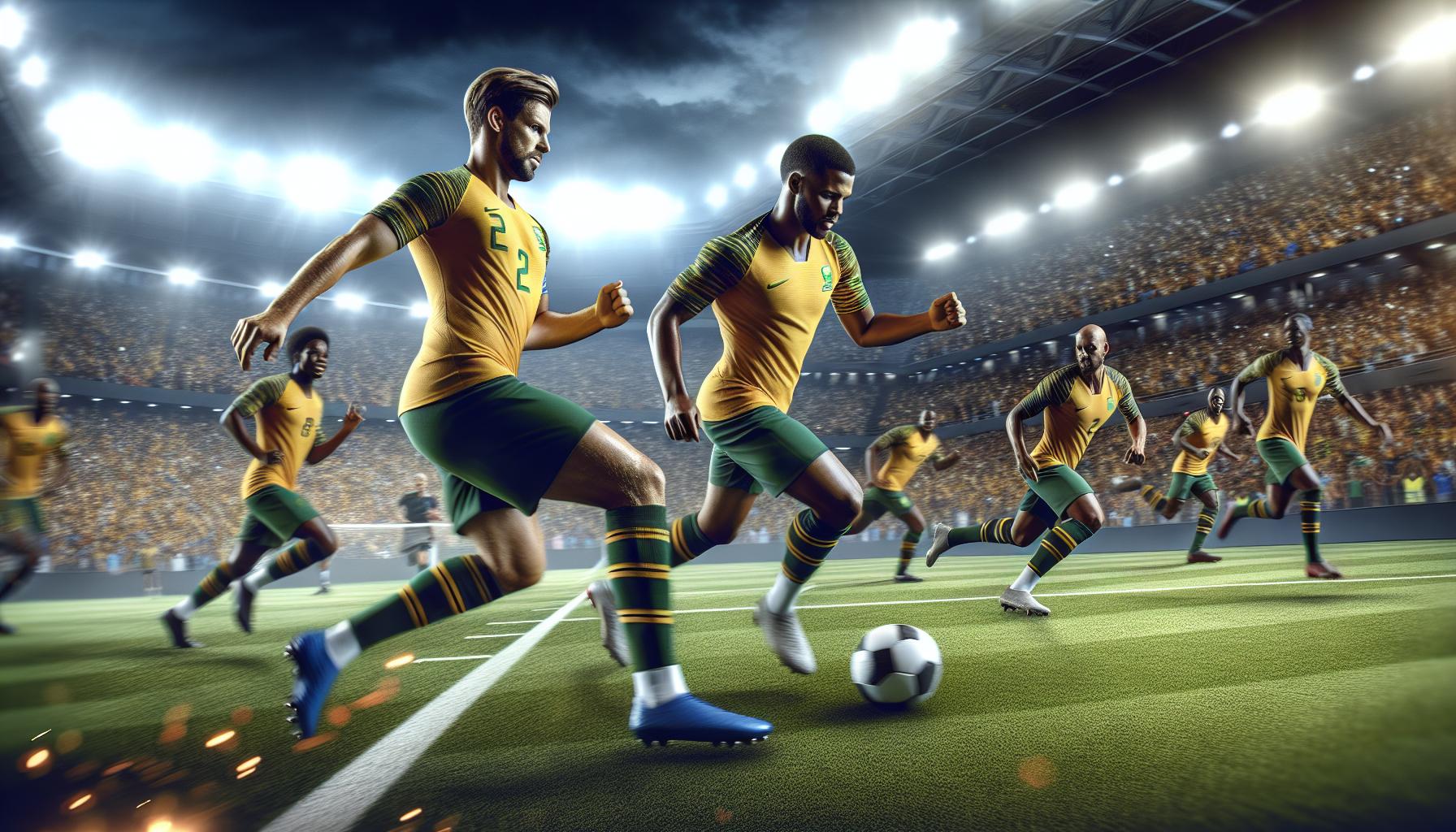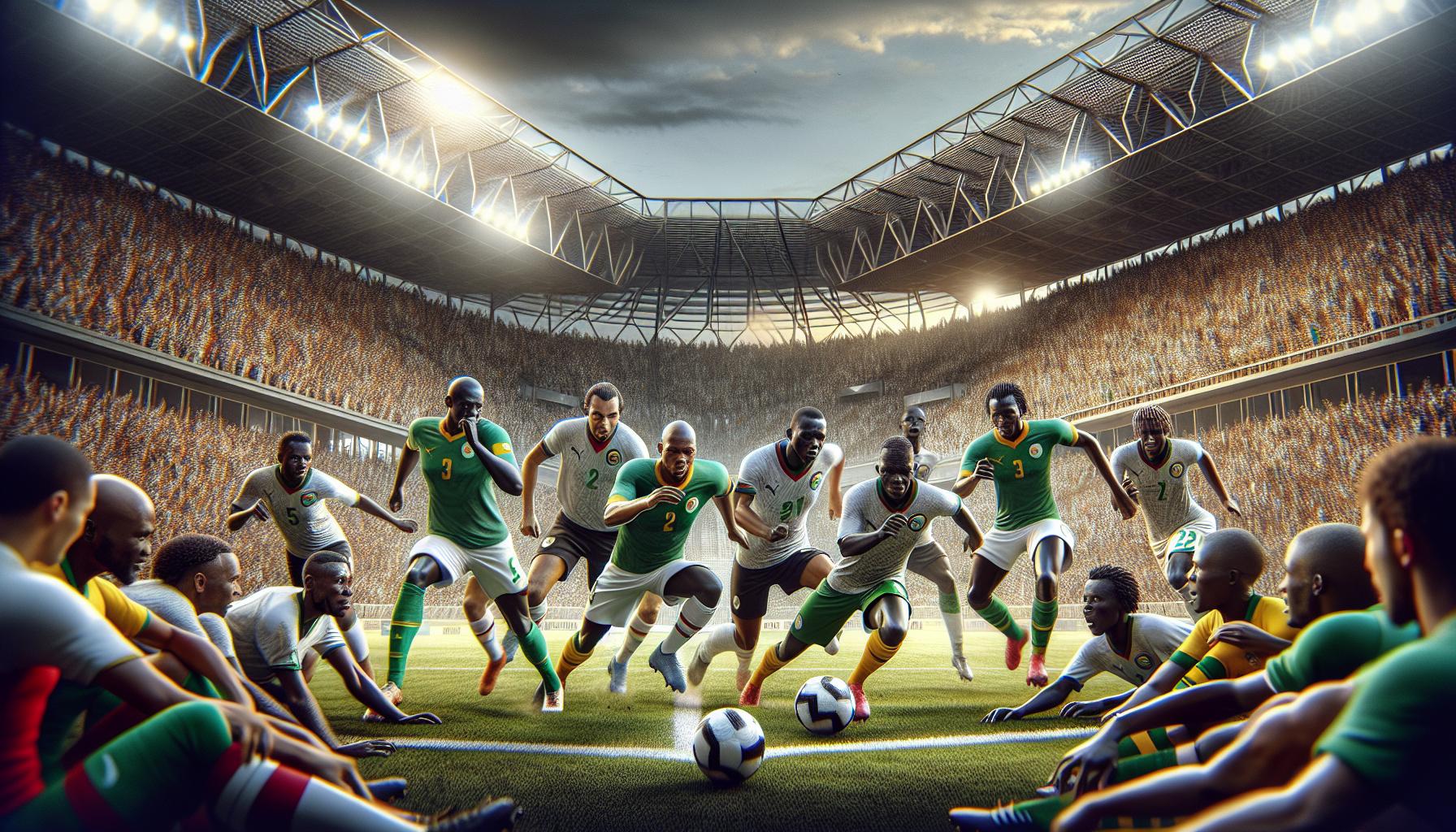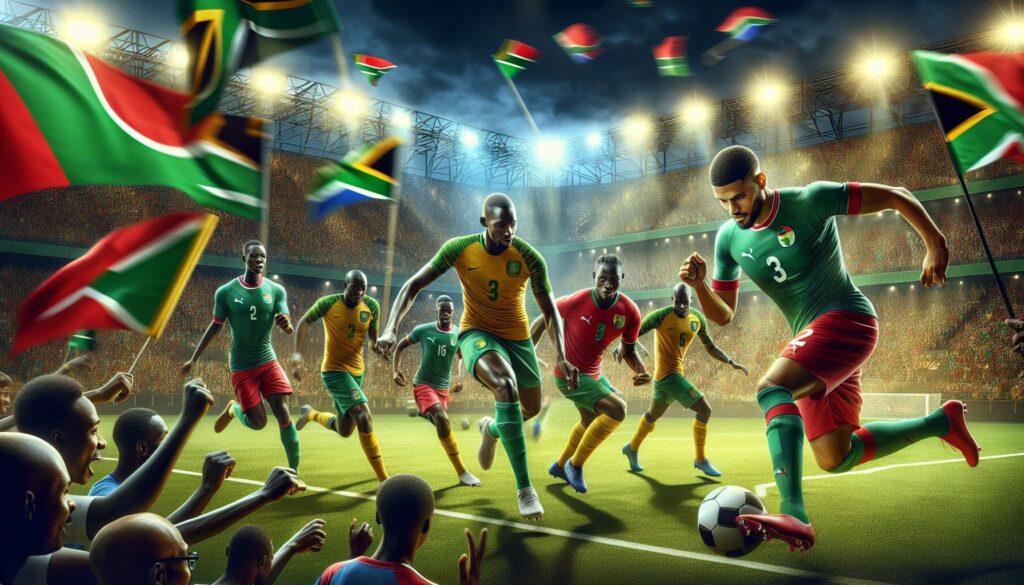As a passionate soccer enthusiast, I’ve been keeping a close eye on the African football scene, particularly the riveting rivalry between Mali and South Africa. These two powerhouse teams have been making waves in continental competitions, and their performances have significantly impacted their rankings.
I’ll dive into the current standings of Mali’s national football team and South Africa’s squad, exploring how their recent matches have shaped their positions. We’ll examine the factors contributing to their successes and setbacks, giving you a comprehensive understanding of where these teams stand in the African football hierarchy.
Key Takeaways
- Mali currently ranks 49th globally and 6th in Africa, while South Africa sits at 66th globally and 12th in Africa
- Historical rivalry between Mali and South Africa has shaped their standings in continental competitions
- Mali’s focus on youth development and South Africa’s strong domestic league influence their performances
- Both teams face challenges in World Cup qualification, tactical evolution, and maintaining consistency
- Future prospects for Mali look promising, while South Africa shows potential for improvement
- The ongoing rivalry between these nations is expected to drive growth in African football
Équipe du Mali de Football – Équipe D’Afrique Du Sud de Football : Classement
Mali and South Africa’s football rivalry dates back to the 1990s, with both teams consistently competing for dominance in African football. Their encounters have been marked by intense matches and significant moments that have shaped their standings in continental competitions.
Key matches between Mali and South Africa include:
- 2002 Africa Cup of Nations: Mali defeated South Africa 2-0 in the quarter-finals
- 2004 Africa Cup of Nations: South Africa won 2-1 in the group stage
- 2013 Africa Cup of Nations: Mali emerged victorious in the quarter-finals through a penalty shootout
These matches have not only influenced their head-to-head record but also impacted their FIFA rankings. Mali’s victories in crucial tournament stages have often propelled them higher in the rankings, while South Africa’s inconsistent performances have affected their standing.
The rivalry extends beyond direct confrontations, with both teams competing for qualification spots in major tournaments like the Africa Cup of Nations and FIFA World Cup. Their performances in these qualifiers have been pivotal in determining their rankings and reputation within African football.
Factors contributing to the historical rivalry include:
- Tactical approaches: Mali’s physical style vs South Africa’s technical play
- Star players: Iconic footballers representing each nation
- Coaching strategies: Different philosophies adopted by team managers
- Home advantage: Impact of playing conditions in respective countries
As both teams continue to evolve, their historical rivalry remains a significant aspect of African football, influencing their current standings and future aspirations in continental and global competitions.
Mali National Football Team: Overview and Achievements

The Mali national football team, known as Les Aigles (The Eagles), has emerged as a formidable force in African soccer. I’ll explore the team’s key players, coaches, and notable tournament performances that have shaped their standing in continental and global football.
Key Players and Coaches
Mali’s success on the international stage is largely attributed to its talented roster and experienced coaching staff. Moussa Marega, a prolific striker, has been instrumental in Mali’s attacking prowess, scoring crucial goals in major tournaments. Amadou Haidara, a dynamic midfielder, provides creativity and control in the center of the pitch. In defense, Hamari Traoré’s leadership and tactical awareness have solidified Mali’s backline.
Mohamed Magassouba, the current head coach, has implemented a disciplined and tactical approach since taking charge in 2017. His emphasis on youth development and tactical flexibility has rejuvenated the team’s playing style. Previous coaches like Alain Giresse and Henryk Kasperczak laid the foundation for Mali’s competitive edge in African football.
Notable Tournament Performances
Mali’s performances in major tournaments have significantly boosted their reputation. In the 2002 Africa Cup of Nations, Mali secured a fourth-place finish, marking their best performance in the competition. They replicated this achievement in the 2004 and 2013 editions, showcasing consistency at the continental level.
The team’s FIFA World Cup qualification campaigns have been challenging, with Mali yet to secure a spot in the finals. However, their performances in the qualifiers have improved over the years, with narrow misses in recent cycles. Mali’s participation in the African Nations Championship has yielded positive results, including a second-place finish in the 2016 edition.
South Africa National Football Team: Profile and Success

The South Africa national football team, affectionately known as Bafana Bafana, has a rich history in African soccer. Their journey from international isolation to continental champions showcases their resilience and talent on the global stage.
Bafana Bafana’s Star Athletes
South Africa’s national team boasts several standout players who’ve made significant impacts on both domestic and international stages. Benni McCarthy, the country’s all-time leading goalscorer with 31 goals, spearheaded Bafana Bafana’s attack for over a decade. Lucas Radebe, renowned for his leadership and defensive prowess, captained both the national team and Leeds United in England. Steven Pienaar, with his exceptional midfield skills, became a fan favorite at Everton and Tottenham Hotspur. Current star Percy Tau continues this legacy, impressing with his performances for Brighton & Hove Albion and Al Ahly. Goalkeeper Itumeleng Khune’s shot-stopping abilities and distribution skills have earned him over 90 caps for the national team.
Major Milestones in South African Soccer
South Africa’s football journey includes numerous significant achievements. Their readmission to FIFA in 1992, following the end of apartheid, marked a new era for Bafana Bafana. The team’s crowning glory came in 1996 when they won the Africa Cup of Nations on home soil, defeating Tunisia 2-0 in the final. This victory, just two years after their international return, showcased their rapid rise in African football. South Africa’s first FIFA World Cup appearance in 1998 further solidified their status on the global stage. In 2010, they made history by becoming the first African nation to host the FIFA World Cup, although they didn’t progress past the group stage. Their consistent appearances in AFCON tournaments, including reaching the quarter-finals in 2000 and 2019, demonstrate their competitive spirit in continental competitions.
Head-to-Head Encounters: Mali vs South Africa

The rivalry between Mali and South Africa has produced several memorable matches over the years. Their head-to-head encounters have shaped the competitive landscape of African football and influenced their respective rankings.
Memorable Matches and Results
Mali and South Africa’s clashes have often been intense and closely contested. The 2002 Africa Cup of Nations quarter-final saw Mali emerge victorious with a 2-0 win, marking a significant moment in their football history. In 2004, South Africa exacted revenge with a 2-1 victory in the group stages of the same tournament. The 2013 Africa Cup of Nations brought another crucial encounter, with Mali securing a 3-1 win on penalties after a 1-1 draw in the quarter-finals. These matches have not only been pivotal in determining tournament outcomes but have also significantly impacted the teams’ continental standings and FIFA rankings.
| Statistic | Mali | South Africa |
|---|---|---|
| Wins | 3 | 2 |
| Draws | 2 | 2 |
| Losses | 2 | 3 |
| Goals For | 8 | 7 |
| Goals Against | 7 | 8 |
The head-to-head statistics reveal a closely matched rivalry between Mali and South Africa. Mali holds a slight edge with three wins to South Africa’s two, while both teams have recorded two draws. In terms of goal difference, Mali has scored one more and conceded one less than their South African counterparts. These numbers highlight the competitive nature of their encounters and explain the minimal difference in their FIFA rankings over the years. The balanced nature of their rivalry has contributed to the anticipation and excitement surrounding their matches, making each encounter a potential turning point in their respective footballing trajectories.
Current FIFA Rankings and African Standing
The FIFA rankings provide a crucial insight into the competitive positions of Mali and South Africa within African football. These rankings reflect each team’s recent performances and their standing among other African nations.
Mali’s Position in African Football
Mali currently ranks 49th in the FIFA World Rankings and 6th among African nations. This impressive standing showcases Mali’s consistent performances in continental competitions. The Eagles have maintained a top 10 position in Africa for several years, thanks to strong showings in the Africa Cup of Nations and World Cup qualifiers. Their recent success in international friendlies and competitive matches has solidified their status as one of Africa’s footballing powerhouses.
South Africa’s Rank Among African Nations
South Africa sits at 66th in the FIFA World Rankings and 12th among African teams. While not as high as their golden era in the late 1990s and early 2000s, Bafana Bafana remain a respected force in African football. Their ranking reflects recent challenges in major tournaments and qualifiers. However, South Africa’s rich footballing history, including their Africa Cup of Nations triumph and World Cup hosting experience, continues to influence their standing in the continent. The team’s ongoing efforts to rebuild and develop young talent aim to improve their ranking in the coming years.
Factors Influencing Team Performance and Rankings
Several key factors significantly impact the performance and rankings of Mali and South Africa’s national soccer teams. These factors shape their competitive edge and determine their standing in African and global football.
Youth Development Programs
Youth development programs play a crucial role in shaping the future of Mali and South Africa’s national teams. Mali’s focus on nurturing young talent has yielded impressive results, with players like Amadou Haidara emerging from their youth ranks. The Mali Football Federation invests heavily in grassroots programs, partnering with local clubs to identify and develop promising young players. South Africa’s youth development, while historically strong, has faced challenges in recent years. The South African Football Association (SAFA) has implemented initiatives like the National U17 League to bridge the gap between youth and senior levels, aiming to create a sustainable pipeline of talent for Bafana Bafana.
Domestic League Strength
The strength of domestic leagues significantly influences national team performance. Mali’s domestic league, the Malien Première Division, has improved in competitiveness, providing a platform for local talent to develop. However, it still lags behind more established African leagues in terms of infrastructure and financial resources. South Africa’s Premier Soccer League (PSL) is widely regarded as one of Africa’s strongest domestic competitions. The PSL’s high level of professionalism, financial stability, and quality of play contribute to the development of South African players, enhancing the national team’s talent pool. The contrasting strengths of these domestic leagues impact player development and, consequently, the performance of their respective national teams in international competitions.
Future Prospects for Mali and South Africa in African Football
Mali’s future in African football looks promising. Their consistent performances in recent years have established them as a formidable force. The Eagles’ focus on youth development programs is paying dividends, producing talented players like Amadou Haidara and Moussa Djenepo. These young stars are gaining valuable experience in top European leagues, enhancing Mali’s competitiveness on the international stage.
South Africa’s prospects, while challenging, show potential for improvement. Bafana Bafana’s rich footballing history and the strength of the Premier Soccer League provide a solid foundation for future success. The emergence of players like Percy Tau and Luther Singh in European leagues signals a positive trend in player development.
Both nations face similar challenges in their quest for continental dominance:
- World Cup qualification: Reaching the FIFA World Cup remains a primary goal for both teams.
- Tactical evolution: Adapting to modern football trends is crucial for continued success.
- Consistency: Maintaining high-level performances across tournaments is essential.
- Infrastructure development: Improving training facilities and grassroots programs is key.
- Coaching stability: Long-term strategic planning requires consistent leadership.
Mali’s higher FIFA ranking (49th globally, 6th in Africa) positions them favorably for future competitions. Their recent successes in youth tournaments, including the U-20 Africa Cup of Nations, indicate a bright future. South Africa’s lower ranking (66th globally, 12th in Africa) presents an opportunity for significant improvement.
The rivalry between Mali and South Africa will likely intensify in coming years, driving both teams to elevate their performances. As these nations continue to invest in their football programs, their impact on African football is expected to grow, potentially reshaping the continental hierarchy.
Mali-South Africa Soccer Rivalry
The Mali-South Africa soccer rivalry epitomizes the dynamic nature of African football. Both teams have rich histories and continue to shape the continent’s soccer landscape. Mali’s recent success and higher FIFA ranking position them as a team to watch while South Africa’s storied past and strong domestic league provide a solid foundation for future growth. As these teams evolve their tactics and nurture young talent they’ll undoubtedly contribute to raising the profile of African soccer on the global stage. I’ll be watching with keen interest as this rivalry unfolds further enhancing the excitement and competitiveness of African football.


